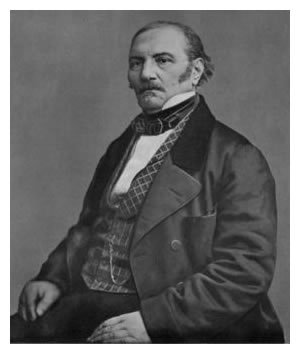Allan Kardec
(1804-1869)
 Allan Kardec is considered the father of Spiritism – as compared to Spiritualism – in France. His real name was Hypolyte Leon Denizard Rivail. The pseudonym originated from mediumistic communications. Both the names “Allan” and “Kardec” were said to have been his names in previous incarnations.
Allan Kardec is considered the father of Spiritism – as compared to Spiritualism – in France. His real name was Hypolyte Leon Denizard Rivail. The pseudonym originated from mediumistic communications. Both the names “Allan” and “Kardec” were said to have been his names in previous incarnations.
Not much is known about Allan Kardec’s early years within the Spiritualist Movement, but his impact upon Spiritualism is profound.
He is best known for his classic, Le Livre des Esprits (The Spirits’ Book), first published in 1856. Within this book is expounded a new theory of human life and destiny. According to an article by researcher, Alexander Aksakof, in The Spiritualist, in 1875. The Spirits’ Book is based on trance communications received through Mlle. Celina Bequet, a professional somnambulist who, for family reasons, took the name of Celina Japhet and, controlled by her grandfather, M. Hahnemann, and Franz Anton Mesmer, gave medical advice.
Her somnambulist, M. Roustan, believed in reincarnation and, some feel, may have influenced the communications from Spirit. The automatic scripts brought forward a thorough and intriguing doctrine of reincarnation.
The success of The Spirits’ Book cannot be questioned. It is, by far, one of the mostly popular books dealing with mediumship, life in Spirit, and the evolution of the soul. It has attained more than 25 editions and still remains widely read, especially amongst the people of South America, Australia, and New Zealand. It is, without question or equal, the primary text amongst Spiritists.
Later, in 1864, Kardec compiled and wrote Le Livre Des Mediums, or The Medium’s Book. This, too, became successful as a wonderful source of guidance and information on mediumship and mediumistic development.
The Medium’s Book and The Spirits’ Book are Allan Kardec’s most lasting signature upon the Spiritualist Movement. Both books are superb and a must for all students of the subject.
Allan Kardec, although a Spiritualist, departed, with tremendous determination, from traditional Spiritualist teaching concerning the growth and evolution of the soul. He believed and strongly advocated – as do we – the doctrine of reincarnation. In order to clearly delineate his teachings from traditional Spiritualism, the term “Spiritism” was adopted and still used amongst many people. There are other areas of thought which distinguish Spiritualism from Spiritism, but the concept of reincarnation remains the most predominant.
It is said the Allan Kardec tended to be dogmatic about the issue of reincarnation. Furthermore, it is said that his categorical views on reincarnation caused him to disparage the practice of physical mediumship, which, for some reason, tended not to promote this doctrine of the Spirit. Finally, it is said that a rift came about between him and the famous medium, D. D. Home, because Mr. Home denounced the doctrine of reincarnation. How many of these allegations concerning Allan Kardec’s character are based on truth only the people involved can answer for sure; but this we do know: Allan Kardec’s contribution to the cause of Spiritualism was magnificent. He helped bring forth some of the most profound and insightful teachings concerning Spirit and Spirit communication.
Other books written by Allan Kardec are: The Gospel as Explained by Spirits (1864); Heaven and Hell (1865); Genesis (1867); and Experimental Spiritism and Spiritualist Philosophy.
Our benefactor, Marcellus Ayer, must have thought rather highly of Allan Kardec’s works. He had several copies of all his books in our Library for both study and classroom purposes.
RETURN TO THE SPIRITUAL TEACHINGS MAIN PAGE
First Spiritual Temple
Kingston, NY 12401
Email us [email protected]
Please consider making a tax-deductible donation to our Temple. You may also donate via check, payable to "FIRST SPIRITUAL TEMPLE TRUST" and mailed to: 104 Van Gaasbeck St., Kingston, NY 12401. Thank you.
